WFSO Administrative Offices
1300 Lamar Street
Wichita Falls, TX 76301

The MUSE Program offers complimentary concert tickets to local middle school and high school orchestra and band students for WFSO classical performances that take place at First Baptist Church. Each student and their chaperone receive free admission, providing an opportunity to experience live symphonic music and support their music education.
For pop concerts, student tickets are available for just $10 (chaperones pay regular admission).
Our goal is to recognize and support young musicians in our community and inspire them to continue exploring a future in music.
Pop Concerts for the 2025-2026 Season at First Baptist Church:
Hollywood Hits: Music from the Movies — October 18th, 2025
Sounds of the Season — December 13, 2025
Classical Concerts for the 2025-2026 Season at First Baptist Church:
Woven in Song — January 31, 2026
Music from the New World — April 25, 2026
Because of limited seating, we are not offering complimentary tickets to the Saint-Saëns: Organ Symphony concert on March 7, 2026 at First United Methodist Church.
(Source: Learning, Arts and the Brain)
Thousands of scientific and academic studies have shown that music education improves academic achievement, builds communication skills, fosters creativity, develops teamwork, and increases engagement in school.
Higher SAT Scores
Students who studied music performance and music appreciation scored higher on the SAT than students with no arts participation. Students in music performance scored 57 points higher on the verbal and 41 points higher on the math, and students in music appreciation scored 63 points higher on verbal and 44 points higher on the math.
(Source: The College Entrance Examination Board).
Positive Impact on the Brain
Musicians have structurally and functionally different brains compared with non-musicians. In particular, the areas of the brain used to process music are larger or more active in musicians. Even just starting to learn a musical instrument changes the neurophysiology of the brain.
(Source: Johns Hopkins Brain Science Institute)
Higher Levels of Mathematics Proficiency
Students who report consistent, high-level involvement in instrumental music over the middle and high school years show significantly higher levels of mathematics proficiency by grade 12.
(Source: Champions of Change: The Impact of the Arts on Learning)
Improves Spatial-Temporal Reasoning
Music training improves scores in spatial-temporal reasoning used in higher levels of science and math.
(Source: Keeping Mozart in Mind)
Higher Standardized Test Scores
Students in high-quality school music programs score higher on standardized tests compared to students in schools with deficient music education programs, regardless of the socioeconomic level of the school or school district.
(Source: Journal of Research in Music Education)
Better Speech Processing & Language Interpretation
Playing an instrument helps youngsters better process speech in noisy classrooms and more accurately interpret the nuances of language that are conveyed by subtle changes in the human voice.
(Source: Physiology and Communication Sciences at Northwestern University)